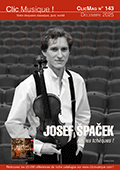 J’avais salué l’album des opus concertants, premier paru de cette nouvelle intégrale, je guettais les deux Concertos. Ekaterina Litvintseva, dont je suis avec gourmandise tous les disques, allait-elle y être aussi brillante et aussi poète ? Pari gagné, avec ce flair, cette élégance dans la simplicité et ce grand caractère qu’elle met aux deux finals, ses Concertos sont simplement superbes, le grand geste du Premier tenu dans un jeu de haute école, classique, refusant l’épanchement pour mieux saisir l’émotion, la nature plus rapsode, plus fugace du Second se trouvant merveilleusement détaillée sans que le ligne en pâtisse ; ce grand jeu, cette sonorité nourrie que vient anoblir cet art de phraser qui fait les vrais interprètes de Chopin, quel plaisir ! D’autant qu’ici tout est simple et fluide, même l’orchestre discret, parce que musicien, mené avec art par Vahan Mardirossian. Et maintenant si Ekaterina Litvintseva, abonnée au répertoire concertant, revenait à son seul piano et à celui de Chopin ? Les Nocturnes, les Mazurkas l’espèrent. (Discophilia - Artalinna.com) (Jean-Charles Hoffelé)  Ekaterina Litvintseva began playing the piano at the age of four, and studied music from 1994 to 2001 at the Children's Music School in the remote Russian town of Anadyr, on the Bering Straits. At 15, her family moved to Moscow, and she attended the State Chopin Music School. Having since moved to Europe, she has become much admired for her performances and recordings of Romantic classics by Chopin, Brahms and Rachmaninoff, though she has also explored the work of lesser-known composers from the period such as the Croatian pioneer Dora Pejacevic (PCL10226). The present release marks her second recording of the Chopin concertos, made in the Czech town of Pardubice in October 2022, and it completes her recorded survey of the composer’s works for piano and orchestra after the Piano Classics album of the lesser-known Variations on Mozart, Fantasia, Krakowiak and Andante spianato and Grande Polonaise. Litvintseva has extensive experience of working with conductor Vahan Mardirossian: ‘We are a perfect team,’ she says. ‘For me, if you want to express your feelings in the deepest way as a pianist, you have to learn the music of Chopin. This is a unique opportunity for me, being able to re-record the concertos six years later, and I have re-thought many aspects of my interpretations. I think I have something to say in this music. It flows so naturally, and it’s written in a brilliant style shared by many other composers of Chopin’s day, but only he could also bring such poetic expression to the brilliance. My job is not to destroy the music with artificial intervention, but to let it flow through my mind and through my hands. I simply want listeners to be touched by this music.’
 |
